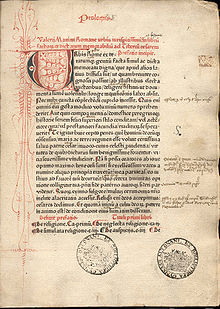Facta et dicta memorabilia
The Factorum ac dictorum memorabilium libri IX ( Factorum et dictorum memorabilium libri novem , “Nine books of memorable deeds and sayings”, also known as De factis dictisque memorabilibus or Facta et dicta memorabilia ) by Valerius Maximus (approx. 20 BC-50 AD), "Memories" for short, are a collection of about a thousand short stories, so-called "periods", written around 30 or 31 AD under the reign of Emperor Tiberius . They are mainly anecdotes illustrating the life of the Romans in the early republic; But there are also some "foreign" periods, mainly from the Greek area.
Valerius stylizes his anecdotes into so-called Exempla , example stories , d. H. Episodes as role models for his contemporaries. Some stories deal with topics similar to those dealt with in the Old and New Testaments . Not least because of this, the work had a long history of more than 1,700 years and was still very popular at the beginning of the Enlightenment . One read his work in order to consult historical models on personal questions. Public speakers also made use of this fund.
Valerius worked on his work for an estimated ten years. His sources included Cicero , Livius , Sallust , Pompeius Trogus , Marcus Terentius Varro and other historians. Each of the nine books is divided into several chapters. The chapters are divided into topics. Valerius' work is one of the earliest works in Latin literature to use a hierarchical structure. Large areas of Roman life at that time are covered in the 91 chapters.
In his book Valerius treats, for example, the meaning of omens and auspices in the ancient Roman religion, but also virtues such as modesty, generosity, gentleness, compassion or gratitude as well as social and moral topics such as the right upbringing, the role of women and homosexuality. Numerous allusions to daily political events can be found in his books.
other topics
- bravery
- cruelty
- dreams
- loyalty
- Friendship
- Inherent properties
- moderation
- Humility
- omen
- Parental love
- Physical similarities
- Prestigious
- revenge
- Superstition
swell
- Valerius Maximus: Factorum ac dictorum memorabilium libri IX text
- Valerius Maximus: Latin text on The Latin Library
literature
- Henry John Walker: English translation of Valerius Maximus' Memorable Deeds and Sayings: One Thousand Tales from Ancient Rome. Hackett Publishing (2004), ISBN 0-87220-674-2 .

